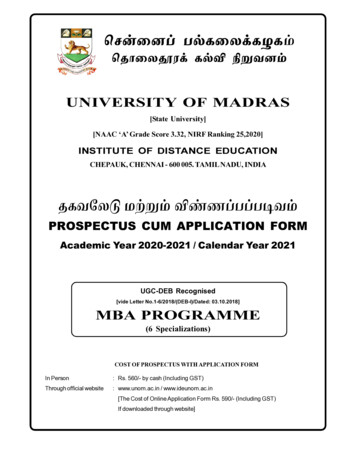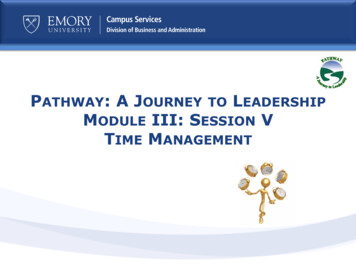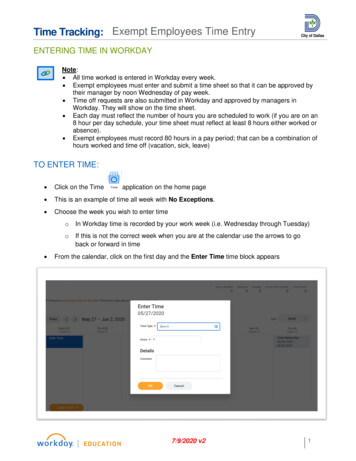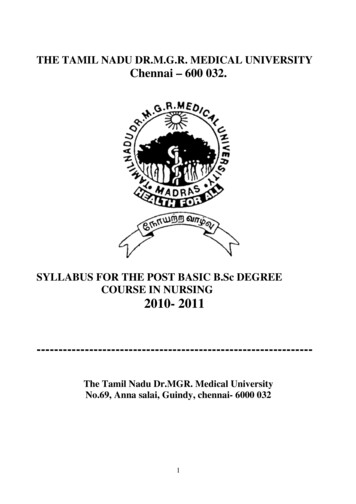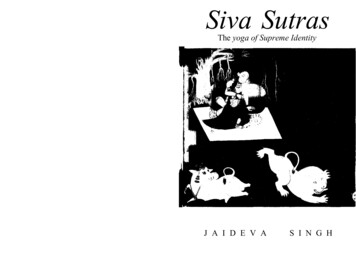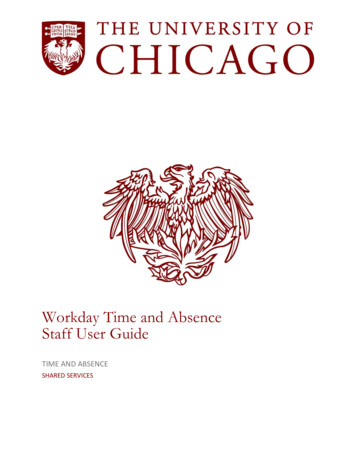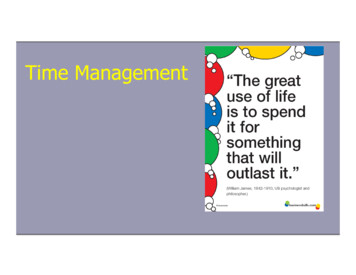
Transcription
Time Management
How best Do you manage your time?Answer in YES/NO1. I think daily planning guides are a waste of time.2. My academic goals are pretty clear to me.3. Leaving assignments until the last minute is big problem forme.4. I organize time very well.5. I wish I were more motivated.6. It’s easy for me to cut short visits with people who drop bywhen I’m studying.7. Visitors should feel free to see me whenever they want.8. I know which activities in my life are important and whichones aren’t.9. I’m a perfectionist in everything I do.10. I have enough time for leisure activities.
Odd Numbered Statements 1 pt. for each YESEven Numbered Statements 1 pt. for each NO1-2 You’re on top but can still improve3-4 You’re treading water5-7 Managing time well is a problem8-10 You’re on the verge of chaos!
It is not time which needs tobe managed;it is ourselves.
GoalsIntroducingSpecific skillsand toolsPrevent StressandprocrastinationAvoid wastingtimeGet moredone inless time
The Relation Between Stress and Time ManagementBad timemanagementStress
What Do We Do With Our LivesSpend : 27 years sleeping 3.3 years eating 5 months waiting at traffic lights 1 year looking for misplaced objects 2 years attempting to return phone calls 4 years doing housework 5 years waiting in lines 13.8 years working
Two hours wasted per day Messy desk Can’t find things Miss appointments Unprepared for meetings Tired/unable to concentrate
“Don't say you don't have enough Time. You have exactly the same number ofhours per day that were given to Helen Keller, Pasteur, Michelangelo, MotherTeresa, Leonardo de Vinci, Thomas Jefferson, and Albert Einstein. ”“ H. Jackson Brown “ Being successful doesn’t make you manage your time well. Managing your time well makes you successful.
Goals, Priorities, and Planning Why am I doing this? What is the goal? Why will I succeed? What happens if I chose not to do it?
One of the very worst uses of time is to dosomething very well that need not be done at all .Brian Tracy
The 80/20 RulePareto’s principle:A small number of causes (20%) is responsible for a large part of theeffect (80%)“the vital few and the trivial many”Some examples : 20% of a person's effort generates 80% of the person's results;80% of your success comes from 20% of your efforts ;80% of a problem can be solved by identifying the correct 20% of theissues80% of the decisions made in meetings come from 20% of the meetingtime
Planning“Planning is bringing the future into the present so you can dosomething about it now .”Alan Lakein“Action without planning is the cause of every failure .”Alex MacKenzieIt takes 15 minutes to plan but this small invest of time will save you at least2 hours in wasted time Plan Each Day, Each Week, Each Semester You can always change your plan, but only once you have one!
TO DO ListsBreak things down into small steps (Like a child cleaning his/her room )Question: How do you eat an elephant?Answer: One bite at a time !How do you eat your biggest ,ugliest frog?You break it down into specific step-by-step activities and then you start onthe first one .Do the ugliest thing first - If you have to eat a frog .don’t spend a lot of timelook at it first ! if you have to eat 3 of them . Don’t start with the smallone !
Covey’s four-quadrant TODODue SoonNot Due SoonImportantUpper LeftUpper RightNot ImportantLower LeftLower Right
Covey’s four-quadrant TODODue SoonNot Due SoonImportant1Upper RightNot ImportantLower LeftLower Right
Covey’s four-quadrant TODODue SoonNot Due SoonImportant1Upper RightNot ImportantLower Left4
Covey’s four-quadrant TODODue SoonNot Due SoonImportant12Not Important34
Think on paper Clarity is the most important conceptin personal productivity.7- steps method for clarifying is :1.Decide exactly what you want .2.Write it down .3.Set a deadline on your goal .4.Make a list of everything you shoulddo to achieve your goal .5.Organize the list into a plan.6.Take action on your planimmediately.7.Resolve to do sth every single daythat moves you toward your majorgoal.
How to Perform these stuff ?
Practice ABCDE Method Continually“The first law of success is concentration , to bend all the energies to onepoint, and to go directly to that point, looking neither to the right nor to theleft .”“William Mathews” A powerful priority-setting technique SoSo simple and effective It can makes you one of the most efficient and effective people in yourfield
To Do List
Example
Some Examples of Setting PriorityTypeTaskTypeTaskTypeTaskTypeTaskA1 A1 A A1 A2 A2 B1 A2 B .B .B2 .B .C C C C D1 D D D1 D2 E E D2 E .F .F .E .
Just as an ExampleTypeTaskA1Doing Work Project (Part 1)A2Preparing my marketingproject ( Part 1)BExercising(Jogging for 30 Mines )CStudyingOrganizational behaviorD1D2EGo shoppingVisiting my uncleCalling my friends
Some Tips
Telephone Keep calls short; stand during call Start by announcing goals for thecall Call people right before the lunch orright before the end of the day Do it with other worksimultaneously
Scheduling Yourself You don’t find time for important things, you make it .Learn tosay “No”.Gentle No’s :“I’ll do it if nobody else steps forward” or “I’ll be your deep fall back,” but youhave to keep searching.
Everyone has Good and Bad TimesFind your creative/thinking time.Defend it ruthlessly, spend it alone, maybe at home.”All I can do is all I can do”Find your dead time.
Gaps
What can someone else do? How am I wasting other people’s time? Deadlines are really important: establish them yourself!
Delegation You can accomplish a lot more with help . Grant authority with responsibility. To the worst job yourself Give them Specific thing to doSpecific date/timeSpecific penaltyOr rewardfor THEM !! Give objectives, not procedures Tell the relative importance of each task
Meeting and Team workPrepare: there must be an agendaan efficient way to keep track of decisions made in a meeting:who is responsible for what by when?
Important Advice Kill your television – 28 hours/week 3 quarters of full time job Eat , Sleep and Exercise . Above all else! Feedback loops: ask in confidence.
ConclusionAction Items1.2.3.Get a day-timer or PDAPut your TODO list in priority orderMake a note in your day-timer to revisit this talk in 30 days.Ask “What have I changed?”
Time is all we have and you mayfind one day you have less thanyou think
7. Visitors should feel free to see me whenever they want. 8. I know which activities in my life are important and which ones aren’t. 9. I’m a perfectionist in every
